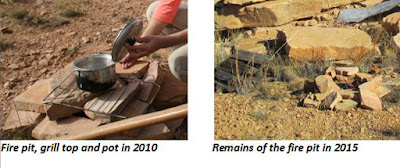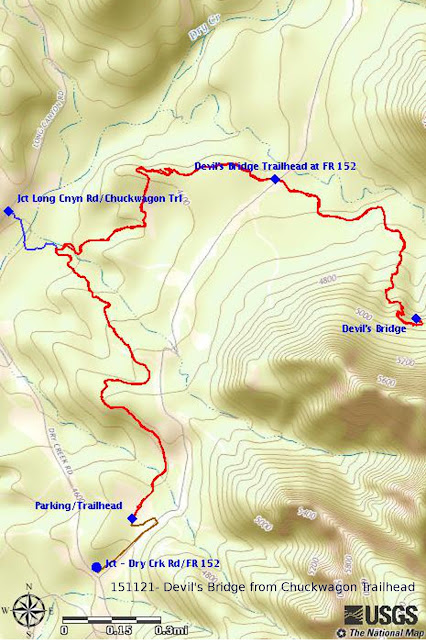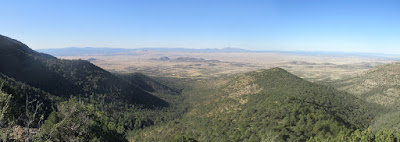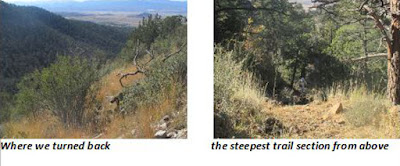The
Skyliners last hiked to Robbers Roost as a group in December of 2010.
It had been even longer for our group leader, Lila Wright, who had
missed that five-year-ago hike. She thought it was time to do it
again and, even though I had hiked there with my Daughter, Diana,
more recently, in October of 2012 to be specific, I agreed.
It
was quite chilly, even with a brightly-shining sun, when we left
Cottonwood shortly after 0800 on 28 November 2015. We traveled north
on Hwy 89A, turned left onto Forest Road 525 at the Sedona Water
Treatment facility (just past mile marker 364) and followed FR 525
for 2.8 miles before turning left onto FR 525C. On FR 525C (Sycamore
Pass Road) we then drove seven miles toward the pass before parking
at the junction with FR 9530.
Shortly
after parking, we paused to take a group photograph.
From
where we were parked it was only about 1.25 miles north on FR 9530 to
the Robbers Roost Trailhead and when Diana and I had driven it in
October 2012 it had been very rough. Diana, said the road was so
rough that the pedometer she was wearing thought she was hiking and
awarded her several hundred steps for the ride. Although still more
suitable for high-clearance, preferably with 4-wheel drive, vehicles
the road has improved greatly since that previous trip. There are no
indications that any formal work has been done, the road is now
fairly heavily traveled and traffic has worn down the worst of the
rough spots.
Had
we limited our hike to just visiting Robbers Roost, the one-way
distance would have been only about 1.75 miles. We decided that was
too short for a decent hike and added a trip to what I call Casner
Quarries. This is the site of some old, abandoned, sandstone
quarries on the slope of Casner Mountain just above the butte in
which Robbers Roost Cave is located. To reach the quarries one just
continues on FR 9530 for about 0.6 miles past the Robbers Roost
Trailhead to the remains of an old shack at a fork in the road.
 |
| Remains of an old shack at a fork in the road |
To
this point the road could still be driven in a 4-wheel drive,
high-clearance vehicle. However, neither road is driveable after the
fork.
The
left fork leads sharply on up the mountain for a short distance and
then levels out as it follows along a rock seam that was the site of
one or more of the abandoned sandstone quarries. The right fork, on
the other hand, continues at a gentle slope along a lower seam. We
had investigated both roads in 2010 and found the lower one to be
both more interesting and a lot easier, so we chose the lower road.
Having
climbed more than 500 feet in the 0.6 miles from the Robbers Roost
Trailhead to the fork in the road we appreciated the now essentially
level trail. In a few places along the way, however, catclaw mesquite
and prickly pear cactus seemed to be in competition to see which
would be first to snag the unwary hiker. But with a bit of care, it
was possible to avoid most of the claws and needles.
About
a hundred yards from the fork we came to the remains of a makeshift
shelter that someone had formed with the use of left over slabs of
sandstone and tin roofing scavenged from the old shack. The shelter
had looked rather cozy in 2010 (below left)
but was now almost unrecognizable (below right).
At
the time of our 2010 visit the area showed signs of someone having
recently camped at this spot, possibly for several days. This was
evidenced by indications of recent use of the shelter, by a small,
recently used fire pit with a metal mesh grill on top and a cooking
pot still setting on the grill. John McInerney took a photograph of
the fire pit and the pot (below left)
during our 2010 visit. The fire pit still exists along with a small
supply of wood (below right).
However, the grill top and the cooking pot are long gone.
The
views were such as to distract us from watching out for the bearclaw
mesquite and prickly pear cactus. The photograph shown below, taking
looking east, is an example.
 |
| The Mogollon Rim is seen on the horizon; closer in, Doe Mountain with its distinctive flat top is visible at left, followed by Cockscomb, Courthouse Butte and Scheurman Mountain |
Quarrying
here must have relatively straightforward. The sandstone formation
is neatly stacked in layers of various thicknesses as shown below.
 |
Layered sandstone formation at old quarry site on Casner Mountain
|
We
came to the end of the road (below left)
after about 0.2 miles from the fork. Looking across the wash where
the road ended (below right), it at first
appeared that the road would continue. However, the road seen there
did not connect with the one we were following.
Turning
back we stopped at a wide grassy shelf for a rest and a snack. From
our perch we had great views looking out over Robbers Roost Butte
directly below and on across the Verde Valley to the Black Hills and
the far distant mountains farther south along the Verde River.
 |
Robbers Roost formation in the center
|
As
we continued back down the mountain following our snack break we had
a great view of Black Mountain which forms the south shoulder of
Sycamore Gap.
 |
Black Mountain at right, Sugarloaf at the left shoulder of Black Mountain, Black Hills on the distant horizon
|
We had become quite
strung out on the way down the mountain and on reaching the unmarked
Robbers Roost Trailhead we waited until we were all together again.
The trail to the cave is only about 0.5 miles and is well-traveled
and easy to follow for the most part, but one can go astray near the
top of the butte. From the parking area it drops down into a wash
and then climbs the other side to a saddle between Robbers Roost
Butte and Casner Mountain proper. Upon reaching the saddle the trail
continues sharply up the steep slope of the butte. Just below the
top, a less traveled side trail leads off to the left, turns a corner
and comes out at a sheer cliff face about 100 yards short of the
cave. While the way appears precarious, there is enough footing to
permit safe navigation. A very narrow trail covers part of the
distance; for the rest of the way the hiker just leans into the cliff
face and takes advantage of the rough surface of the rock for
footing. The below photograph shows the narrow trail followed by the
bare section of cliff wall just before reaching the cave.
 |
| Trail along cliff wall to Robbers Roost Cave |
During
our 2012 hike, Diana photographed the cave as she approached along
the path.
 |
Robbers
Roost Cave
|
Although
Robbers Roost is the generally accepted name for this cave, I have
also found that some call it Shaman Cave. This may explain the
hippy-looking character Diana and I encountered here in 2012. That
experience is described in my book, Hiking in Northern Arizona –
2012/2013.1
While we were still
in the cave, a bare-chested young man with long black hair, arrived
with a guitar and what appeared to be a prayer rug. Seemingly under
the influence of something, he mumbled something about it being,
contrary to what he had been told, around four miles from where he
started his hike. We gathered that he had come across country from
the Indian Ruins at Loy Butte which, as he put it, were “locked up
by the United States of ...,” followed by some indistinguishable
muttering. The muttering included the word “wasp,” but I did not
feel that it was meant as “WASP” or in any pejorative manner at
all. He declined to have his picture taken and, when he started to
to unroll his prayer rug, we left him to his meditations, continued
along the now even more steeply slanting cliff face until we found a
suitable spot and climbed on up to the top of the butte.
The highest point on
the butte is located at the southwest corner, and that is where we
planned to eat lunch. However, when we arrived, another couple were
busy taking pictures at that spot, so we sat down and waited for a
few minutes until they left. They apparently dropped down to visit
the cave afterward as the man later remarked to Diana that he had
listened to the young man in the cave playing his guitar and that it
was “magical and awesome.”
The name Robbers Roost
does not seem to be associated with any specific incident or any
particular group of outlaws. Local legend as told to me by a, now
deceased, hike leader, has it that the cave was once used by
bootleggers and bandits. Sedona Monthly, which chose Robbers
Roost as their Hike of the Month for March
2015, said in their description that “ A film called Robbers Roost
was photographed in Sedona in 1923, but no scenes were filmed at its
namesake.”2
Leaving
the cave behind, we continued on along the cliff face for a short
distance and climbed up to the top of the butte through a convenient
crevice. It was now time for lunch and we all settled down to eat,
and in my case have a short nap. It was still pretty chilly and a
steady breeze was blowing across the top of the butte. However, I
managed to find a clump of grass which provided some cover and was
relatively comfortable. I don't know how long I slept before I awoke
to the sound of people stirring about getting ready to leave. We
were back to our vehicles and ready to head home by 1330.
We
had seen a relatively large number of hikers today and I wondered if
the Sedona
Monthly
article had caused that. I think we may have seen two hikers in 2010
and Diana and I saw seven in 2012. Today, however, there were at
least fifteen hikers in addition to our group of nineteen. Oh, well,
at least the increased traffic has had a positive effect on the road
to the trailhead.
The
hike distance today was 5.3 miles according to my GPS track. The
highest elevation was 5514 feet and the total ascent was 1255 feet.
Our
GPS track is shown in red on the map included below.
1Hiking
in Northern Arizona – 2012/2013, pgs 122-123


















































